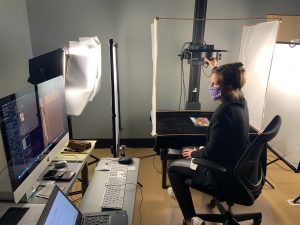Earlier this year and prior to the pandemic, Digital Production Center (DPC) staff piloted an alternative approach to digitize patron requests with the Rubenstein Library’s Research Services (RLRS) team. The previous approach was focused on digitizing specific items that instruction librarians and patrons requested, and these items were delivered directly to that person. The alternative strategy, the Folder Level digitization approach, involves digitizing the contents of the entire folder that the item is contained in, ingesting these materials to the Duke Digital Repository (to enable Duke Library staff to retrieve these items), and when possible, publishing these materials so that they are available to anyone with internet access. This soft launch prepared us for what is now an all-hands-on-deck-but-in-a-socially-distant-manner digitization workflow.

Since returning to campus for onsite digitization in late June, the DPC’s primary focus has been to perfect and ramp up this new workflow. It is important to note that the term “folder” in this case is more of a concept and that its contents and their conditions vary widely. Some folders may have 2 pages, other folders have over 300 pages. Some folders consists of pamphlets, notebooks, maps, papyri, and bound items. All this to say that a “folder” is a relatively loose term.
Like many initiatives at Duke Libraries, Folder Level Digitization is not just a DPC operation, it is a collaborative effort. This effort includes RLRS working with instructors and patrons to identify and retrieve the materials. RLRS also works with Rubenstein Library Technical Services (RLTS) to create starter digitization guides, which are the building blocks for our digitization guide. Lastly, RLRS vets the materials and determines their level of access. When necessary, Duke Library’s Conservation team steps in to prepare materials for digitization. After the materials are digitized, ingest and metadata work by the Digital Collections and Curation Services as well as the RLTS teams ensure that the materials are preserved and available in our systems.

Doing this work in the midst of a pandemic requires that DPC work closely with the Rubenstein Library Access Services Reproduction Team (a section of RLRS) to track our workflow using a Google Doc. We track the point where the materials are identified by RLRS, through multiple quarantine periods, scanning, post processing, file delivery, to ingest. Also, DPC staff are digitizing in a manner that is consistent with COVID-19 guidelines. Materials are quarantined before and after they arrive at the DPC, machines and workspaces are cleaned before and after use, capture is done in separate rooms, and quality control is done off site with specialized calibrated monitors.
Since we started Folder Level digitization, the DPC has received close to 200 unique Instruction and Patron requests from RLRS. As of the publication of this post, 207 individual folders (an individual request may contain several folders) have been digitized. In total, we’ve scanned and quality controlled over 26,000 images since we returned to campus!
By digitizing entire folders, we hope this will allow for increased access to the materials without risking damage through their physical handling. So far we anticipate that 80 new digital collections will be ingested to the Duke Digital Repository. This number will only grow as we receive more requests. Folder Level Digitization is an exciting approach towards digital collection development, as it is directly responsive to instruction and researcher needs. With this approach, it is access for one, access for all!


